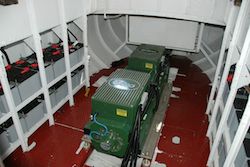Ask most small-boat fishermen what they think of powering with electric motors instead of a diesel or gasoline engine and, if they are being generous, they will probably tell you, "It's a nice idea but not practical for a working boat."
But there are indications that attitude might be slowly changing. A good example of that changing attitude is the pair of EP-10000 electric motors from Elco Motor Yachts that has replaced a 175-hp Detroit Diesel 6-71 in an 86-year-old, 40-foot dredge tender on the New York canals.
A pair of Elco Motor Yachts EP-10000 electric motors power a 40-foot dredge tender on the New York canals. Elco Motor Yachts photoThe engines are mounted in tandem and take up less space and weigh less than the Detroit.
New York's Canal Corp. is comparing the performance and maintenance costs of the twin Elcos against the Detroit for maneuvering dredges and dredge barges on the canal.
So far the EP-10000 electric motors — equal to about 100 horsepower each — are delivering 15 percent more horsepower to the shaft than the Detroit and push the dredge tender to its maximum hull speed of about 8 knots.
It costs about $5 to $6 a day to recharge the dredge tender's 36 Absorbed Glass Mat batteries. Now compare that to filling up with diesel fuel after a day on the fishing grounds.
Besides the dredge tender, electric motors from Elco Motor Yachts currently power a 65-passenger water taxi in Florida and a 66-foot passenger-carrying boat that a Canadian museum operates. Elco is also talking with another Canadian outfit about powering a passenger-carrying 60-foot catamaran with an EP-10000 in each hull.
A Maine fisherman is on the list of potential customers interested in using electric motors, as is a logging company with several small tugs. The logging outfit is especially interested in the electric motors' "green" benefits, since the tugs operate in protected waters and will be penalized for any oil spills.
Comments from the dredge tender's crew indicate that there are significant onboard environmental benefits: There's no smoke with the electric motors, it's easy to have a conversation and there's no vibration.
The environmental benefits plus the cost of recharging batteries at the end of the day — versus paying for diesel fuel or gasoline — just might catch the attention of some commercial fishermen.







